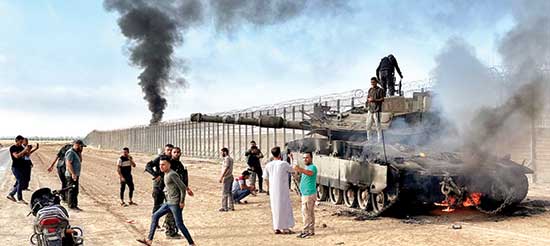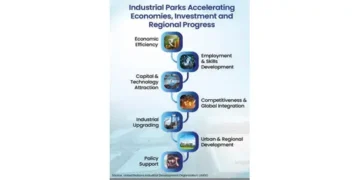 IT took the world, and Israel, by surprise when Hamas launched a surprise attack against Israel on October 7. The fact that the Israeli intelligence had failed was another shocking bit. But what has followed since then has been a conflict which shows little signs of abating and every sign of escalation. The world and its leaders are hard at work to bring about a ceasefire but the chances of that are slim.
IT took the world, and Israel, by surprise when Hamas launched a surprise attack against Israel on October 7. The fact that the Israeli intelligence had failed was another shocking bit. But what has followed since then has been a conflict which shows little signs of abating and every sign of escalation. The world and its leaders are hard at work to bring about a ceasefire but the chances of that are slim.
India, which has been a victim of terrorism for decades, was quick to condemn the barbarous attacks by Hamas. Prime Minister Narendra Modi posted on X that he was deeply shocked by the news of the terrorist attack. “Our thoughts and prayers are with the innocent victims and their families. We stand in solidarity with Israel at this difficult hour,” he said.
Stand on Palestine
The Ministry of External Affairs followed it up with a statement. “India always advocated the resumption of direct negotiations towards establishing a sovereign, independent and viable state of Palestine, living within secure and recognised borders, side by side at peace with Israel,” said a spokesperson of the MEA, emphasising that India’s position on Palestine has been “longstanding and consistent” and that there has been no change in that policy. He also stated that India considers the October 7 strike against Israel a “terrorist attack”.
India also launched Operation Ajay to get Indian nationals out of Israel. It is estimated that there were 18, 000 Indians living in Israel and the Government bore the cost of all expenses as it flew those who wanted to get out of Israel. It is to the credit of Prime Minister Narendra Modi and his Government that made it a priority to get stranded Indians out of the conflict zone.
For India, the conflict in Gaza, which is unlikely to be resolved soon, also presents a delicate act of balancing.
The last few years has seen the India-Israel relationship grow in strength, and the personal chemistry between PM Modi and Israeli Prime Minister Benjamin Netanyahu has greatly contributed to the strength of the ties. But India has a long history of supporting the Palestine cause also. It was only in 1992 that India established full diplomatic ties with Israel, while continuing to support the Palestinian cause.
Balancing act for India
Also, India is mindful of the fact that the Palestine cause is something the Middle East nations continue to support. For India, which has been strengthening its ties with Saudi Arabia, United Arab Emirates (UAE), Egypt and other Gulf nations, this is another balancing that will have to be borne in mind. While many Gulf nations have moved to recognising and developing ties with Israel, the Palestine cause is not something that can simply be wished away.
The horrific Hamas attack has also resulted in Saudi Arabia putting a halt on its resumption of ties with Israel. PM Modi, by condemning the Hamas attack, has rightly sided with Israel as terrorism should have zero-tolerance in the world.
The MEA statement later reiterated India’s commitment to the Palestine cause. For India, in the coming days and weeks, the balancing act will be tough. It will have to find the right balance – condemn the terrorist attacks, and also support humanitarian aid and assistance to the people of Gaza.

































